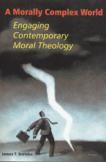Old Meets New
Yes. When I read, I write lots of notes in the margins. What I wrote most often in the margins of this book by James Bretzke is simply yes: yes, what a fine way of putting things; yes, what a wonderful example; yes, I think I’ll use that idea in my own course on Christian morality next time around.
James Bretzke is a Jesuit priest and professor of theology at the University of San Francisco. I don’t know Father Bretzke personally, but two things about him are evident: he is an experienced, skilled teacher and he is a bridge-builder.
I am particularly struck by the way Bretzke builds bridges for his readers, which he does in three ways. First, he not only shows the differences, but also draws the connections between pre- and post-Vatican II expressions of Catholic moral theology. Second, he explains not simply some points of tension, but also many points of contact between the insights of contemporary moral theologians and the official moral teachings of the church. And third, he builds bridges between “the world” of Catholic moral theology and the morally diverse and complex world in which we live.
A Morally Complex World focuses on what moral theologians call fundamental moral theology, the fundamental themes, principles and convictions that are the basis of a Catholic approach to moral issues. At its worst, fundamental moral theology can be dry and abstract. Not so in Bretzke’s book. In an engaging way he brings his discussion of fundamental themes and principles into dialogue with concrete and complex issues of the day, such as whether genetic cloning might be ethically responsible or whether abortion might ever be appropriate. His skillful and sometimes novel explanations of themes and principles often make potentially overly abstract discussions concrete and clear. In an important chapter on the relation between Scripture and ethics, for instance, Bretzke reviews the literature with insight and then offers his own way of viewing the relationship: “a multi-strand double-helix model for scripture and ethics.” I found his approach, made concrete with the double-helix image (and diagram), quite effective.
In Chapter One Bretzke introduces the reader to the complex but important discussion of how Catholic theology draws on four key sources of wisdom: sacred texts, tradition of the community, rational reflection on the normatively human, and human experience. Bretzke calls the last two sources the rational claim axis and discusses them in Chapter Two’s analysis of Catholicism’s longstanding espousal of the natural law theory. The first two sources are described as the sacred claim axis, and they are the topic of Chapter Three’s analysis of the relationship between Scripture and ethics. These first three chapters, taken together, may well be Bretzke’s most important contribution to Catholic moral theology.
It is common today for theologians to acknowledge the importance of these four sources of wisdom for Christian ethics. What is less common is the extended discussion Bretzke devotes to the complex but important interrelationships among the sources. Bretzke builds on the insights of other theologians (most notably James Gustafson and William Spohn; the review of the literature in these chapters is impressive) as he displays the ways in which the four sources and two axes connect with one another and serve as diverse but important sources for Christians trying to discern how to do the right thing in a complex world. Those who like simple answers will not be pleased. Those who think moral maturity requires the ability to embrace moral complexity will likely write many yeses in the margins.
Chapter Four discusses conscience, a must for any work of fundamental moral theology. Bretzke’s analysis of “The Objective and Subjective Poles” of conscience is helpful. Following the lead of the Catholic theologians Josef Fuchs, S.J., and James F. Keenan, S.J., Bretzke’s interest is in showing that “both poles are located within the individual’s conscience-based moral discernment. It is here within the conscience that the individual first discovers and then responds to that law inscribed on the human heart by God.” Typical of his work, Bretzke’s explanation is best at pointing out not simply the ways the objective and subjective features of conscience are distinct, but also the ways they are connected. It is a faith-based, personalistic and dynamic account of conscience and moral discernment. Another yes in the margins.
The final three chapters of the book have a decidedly pastoral dimension to them: a reflection on diverse modes of moral discourse, an analysis of the art of casuistry (building bridges between principles and cases), and a wise and compassionate treatment of sin and moral failure. Earlier, Bretzke makes it clear that he is not interested in a “one-size-fits-all” approach to morality. The complexity and particularity of moral experience make such an approach unwise and ill fated. Instead, he argues (especially in Chapter Six) that what is needed is a principled but flexible method for making connections between key Christian convictions and the diverse and complex moral world in which we live.
A Morally Complex World: Engaging Contemporary Moral Theology is a fine contribution to Catholic moral theology. I hope it finds its way into classrooms of all sorts: seminaries as well as universities, at both undergraduate and graduate levels. But it should be of interest and use to many others. “One-size-fits-all”—no. Diversity, complexity, and intelligence—yes.
This article also appeared in print, under the headline “Old Meets New,” in the June 21, 2004, issue.








